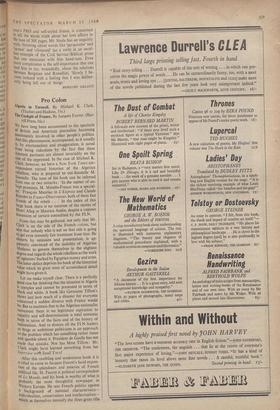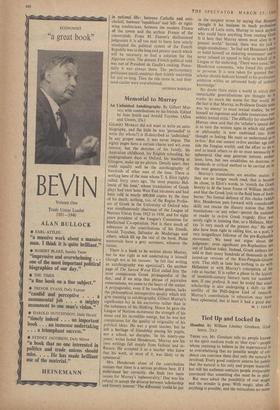Pro Colon
Algeria in Turmoil. By Michael K. Clark. (Thanes and Hudson, 35s.)
WE have long been accustomed to the spectacle of British and American journalists becoming Passionately involved in other people's politics. And this phenomenon, accompanied, as it usually by emotionalism and exaggeration, is saved !Mtn being ridiculous by the fact that these Itinerant partisans are almost invariably on the Side of the oppressed. In the case of Michael K. Clark, however, we have a New York Times cor- respondent turned historian of the Algerian rebellion, who is prepared to out-Soustelle M. ,Soustelle. The tone of his book can be inferred !tom one or two remarks : 'In the matter of un- K. ePI promises, M. Mendes-France was a special- 1st: 'Francois Mauriac in L'Express and Claude Bourdet in France-Observateur, both of them fast friends of the rebels . . In the index of this 1,,arge book there is no mention of the names of rienri Alleg or Maurice Audin, despite a copious discussion of torture committed by the FLN.
From. this may be gathered, not only that Mr. Clark is on the side of the French colons, but also that nobody who is not on that side is going to get even remotely fair treatment from him. He distorts by omission and presentation, is ap- Pe_rently convinced of the inability of Algerian Moslems to govern themselves in the slightest degree and regards the whole rebellion as the work of 'agitators' backed by Egyptian money and arms. The latter defect deprives his book of the historical value which its great mass of accumulated detail might have given it.
Let me make myself clear. There is a perfectly good case for thinking that the situation in Algeria .i3 complex and cannot be presented in terms of black and white. A book like Germaine Tillion's Shows jdst how much of a disaster for everyone concerned a sudden divorce with France would be. But to maintain that in the Algerian nationalist movement there is no legitimate aspiration to equality and self-determination is total nonsense both in terms of the facts and of the history of nationalism. And to dismiss all the FLN leaders as thugs or ambitious politicians is an approach to the problem which has something rather mean and ignoble about it. President de Gaulle has not made that mistake. Nor has Mme Tillion : Mr. Clark might have learned something from her interview with Saadi Yacef.
After this rambling and tendentious book it is a relief to come to Jacques Fauvet's lucid exposi- li°n of the splendours and miseries of French Political life. M. Fauvet is political correspondent of Le Monde, and his book is worthy of what is Probably the most thoughtful newspaper in Western Europe. He sees French politics against a background of national characteristics— individualism, conservatism and intellectualism— Which in themselves intensify the three great rifts
in national life: between Catholic and anti- clerical, between 'republican' and left- or right- wing totalitarians, between the modern France of the towns and the archaic France of the countryside. From M. Fauvet's disillusioned judgments it is all too easy to learn how utterly unadapted the political system of the Fourth Republic was to the long and patient search which will be necessary to find a solution for the Algerian crisis. The present French political void was not of President de Gaulle's making. Poten- tially it was always there. The parliamentary politicians could construct their friable majorities for just so long. Then the tide came in, and their sand-castles were overwhelmed.
ANTHONY HARTLEY



















































 Previous page
Previous page